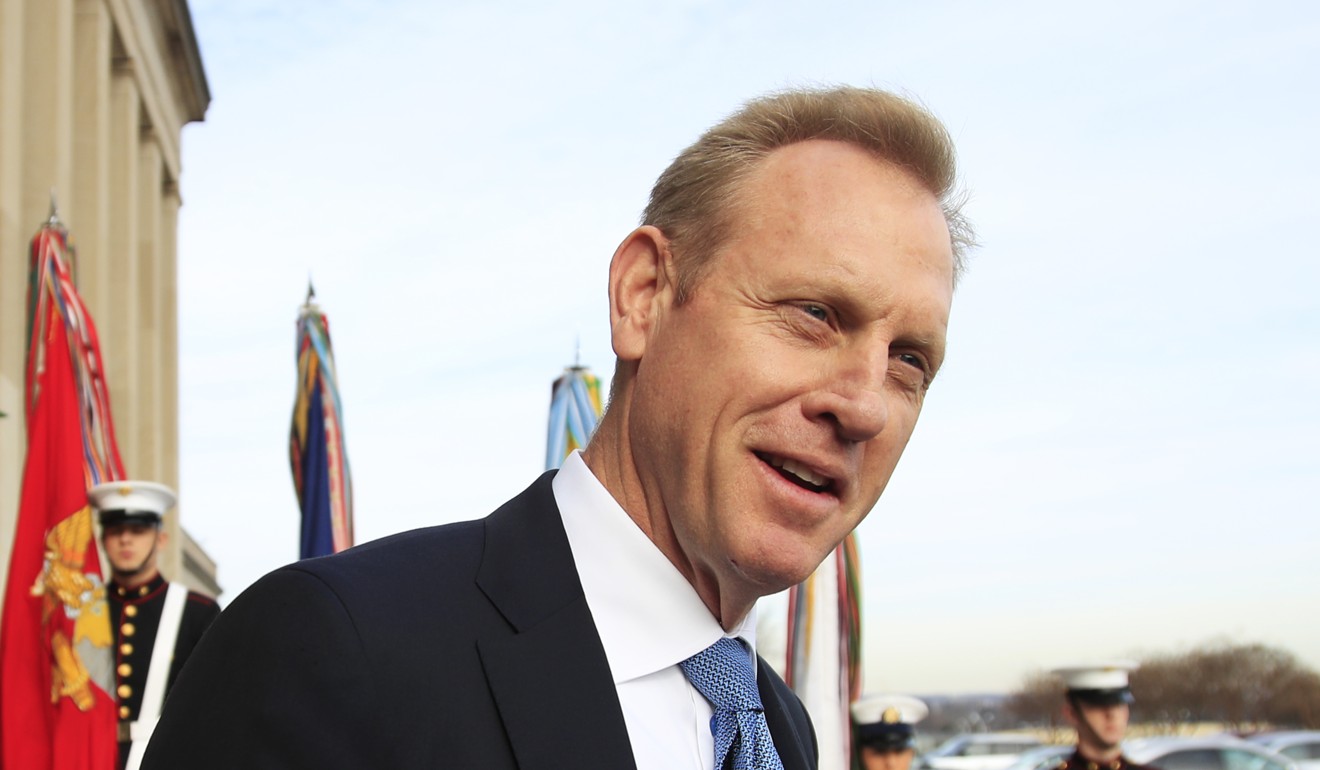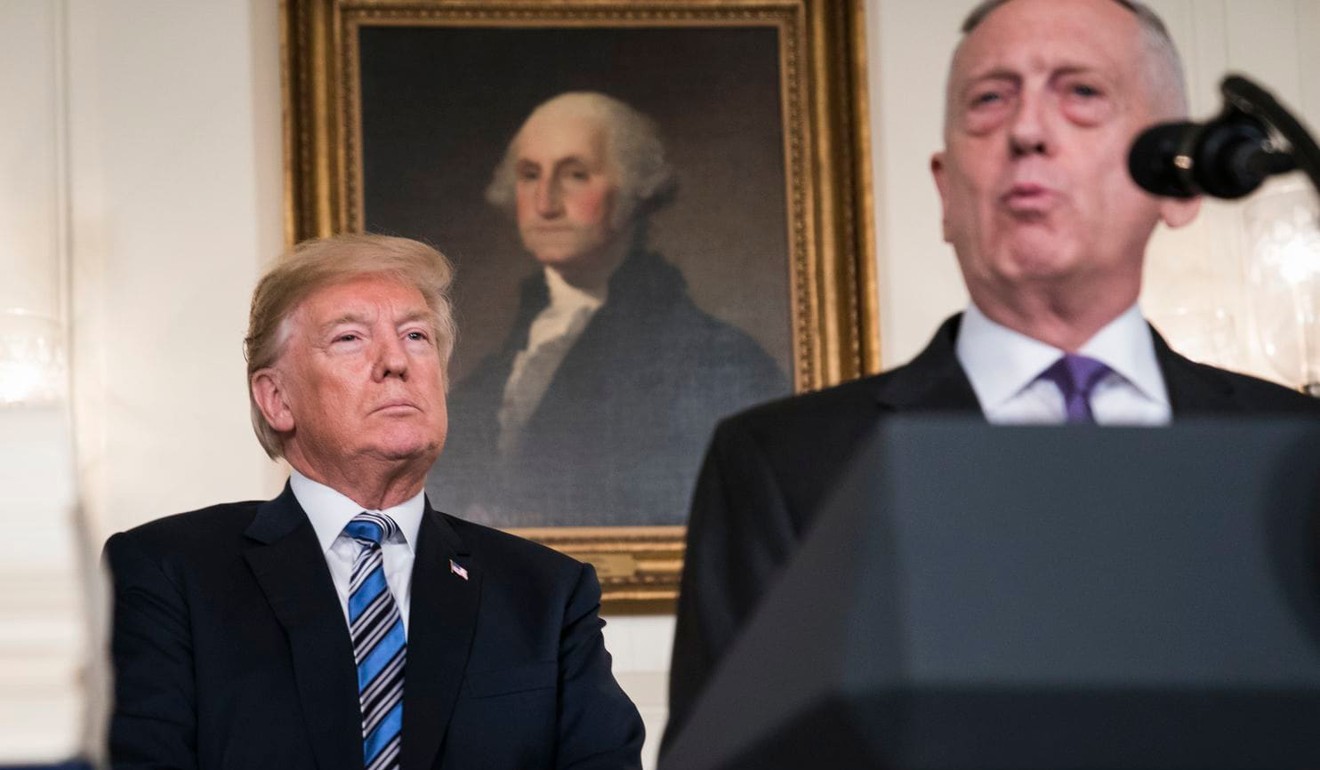
Trump forces James Mattis out two months early, names Patrick Shanahan acting defence secretary
- Former Boeing executive, who was Mattis’ deputy at the Pentagon, will begin role on January 1
- Mattis resigned in protest last week after Trump announced the withdrawal of US troops from Syria
President Donald Trump, who aides said has been frustrated by news coverage of Defence Secretary James Mattis’s scathing resignation letter, abruptly announced Sunday that he was removing Mattis two months before his planned departure and installing Patrick Shanahan as acting defence secretary.
Shanahan, a former Boeing executive who has been Mattis’ deputy at the Pentagon, will assume the top job on an acting capacity beginning January 1, Trump said.
Mattis resigned in protest last week after Trump announced the withdrawal of US troops from Syria over the strong objections of Mattis and others on the national security team. Brett McGurk, the top US envoy to the international coalition fighting the Islamic State militant group, also resigned in protest over Trump’s Syria decision.
In his Thursday resignation letter, Mattis delivered a sharp rebuke of Trump’s world view and cast the president’s foreign policy positions as a threat to the nation.

Mattis said in the letter that he would resign his post on February 28, to allow for a smooth transition to the next defence secretary. But Trump decided to hasten the process, announcing Sunday on Twitter that Shanahan would replace Mattis imminently.
“I am pleased to announce that our very talented Deputy Secretary of Defence, Patrick Shanahan, will assume the title of Acting Secretary of Defence starting January 1, 2019,” Trump wrote. “Patrick has a long list of accomplishments while serving as Deputy, and previously Boeing. He will be great!”
The announcement appeared to catch Pentagon officials off guard. Shanahan was travelling away from Washington when Trump tweeted his decision, and a spokesman for Shanahan declined to comment.
Another defence official, who is close to Mattis and spoke on the condition of anonymity because of the sensitivity of the situation, said: “I think it’s fair to say that there is a lot of uncertainty about this week. I think all of this is coming down in the last hour.”
Army Col. Rob Manning, a Pentagon spokesman, issued a statement Sunday that did not directly address the personnel changes. “The secretary of defence serves at the pleasure of the president,” the statement read. “The department remains focused on national security.”
Trump initially praised Mattis for serving as defence secretary “with distinction” and achieving “tremendous progress.” But as he consumed media coverage in the hours and days that followed Mattis’ resignation, Trump vented to advisers about the narrative that took hold of the revered four-star Marine Corps general and military intellectual walking out on Trump because he believed the president’s erratic decisions were threatening the world order.

Although Mattis’ letter initially annoyed the president, the coverage of it was even more difficult to stomach, according to a senior administration official. Trump told aides that he especially resented the narrative of Mattis as a manager of Trump who served as a human guardrail against the president’s impulses, the official said.
In recent days, Trump went so far as to tell White House aides that he does not need Mattis and that his defence secretary was not as important a figure as others believed, the official said.
Trump was not shy about sharing his frustrations publicly. On Saturday, he complained on Twitter that he was not getting enough credit for the Syria withdrawal: “If anybody but your favourite President, Donald J. Trump, announced that, after decimating IS in Syria, we were going to bring our troops back home (happy & healthy), that person would be the most popular hero in America. With me, hit hard instead by the Fake News Media. Crazy!”
Then the president took a shot directly at Mattis, with a bit of revisionist history. When he picked Mattis to be defence secretary before the start of his presidency, Trump showered praise on him, revelling in the general’s battlefield valour, calling him by his nickname “Mad Dog” and comparing him to the decorated second world war Army general George Patton.
“He is one of the most effective generals that we’ve had in many, many decades, an extraordinary leader of our time who has committed his life to his love for our country,” Trump said in a December 6, 2016, speech announcing the nomination. “General Mattis is the living embodiment of the Marine Corps motto, semper fidelis, always faithful. And the American people are fortunate that man of this character and integrity will now be the civilian leader atop the Department of Defence under his leadership.”
But on Saturday night, Trump wrote on Twitter: “When President Obama ingloriously fired James Mattis, I gave him a second chance. Some thought I shouldn’t, I thought I should. Interesting relationship-but I also gave all of the resources that he never really had. Allies are very important-but not when they take advantage of US.”
Trump also lashed out at McGurk’s resignation, casting the top diplomat as a bit player. The president wrote in a Saturday night tweet, “Brett McGurk, who I do not know, was appointed by President Obama in 2015. Was supposed to leave in February but he just resigned prior to leaving. Grandstander? The Fake News is making such a big deal about this nothing event!”
In replacing Mattis, at least temporarily, Trump has picked Shanahan, who made his name as an executive at Boeing, where he worked for decades, dealing at times with the aviation behemoth’s commercial aircraft and missile defence programmes.
Since his arrival at the Pentagon, Shanahan has emphasised making the department more efficient and business-friendly and has won plaudits at the White House by pushing through Trump’s vision for a space force, against the wishes of many of the building’s leaders and uniformed brass.
Shanahan also has overseen the Pentagon’s audit, its development of a new missile defence policy that still has not been released and a fledgling effort to reduce waste in military expenditures.
Shanahan lacks the kind of foreign policy experience that has become customary among defence secretaries, putting someone atop the Pentagon who lacks the deeply seated views on matters such as withdrawal from Syria and Afghanistan that Mattis held.
If Shanahan stays on as a permanent defence secretary, he is unlikely to push strongly held views on those conflicts – and, when paired with the incoming chairman of the Joint Chiefs of Staff, General Mark A. Milley, could usher in a shift in power further toward the military brass.

